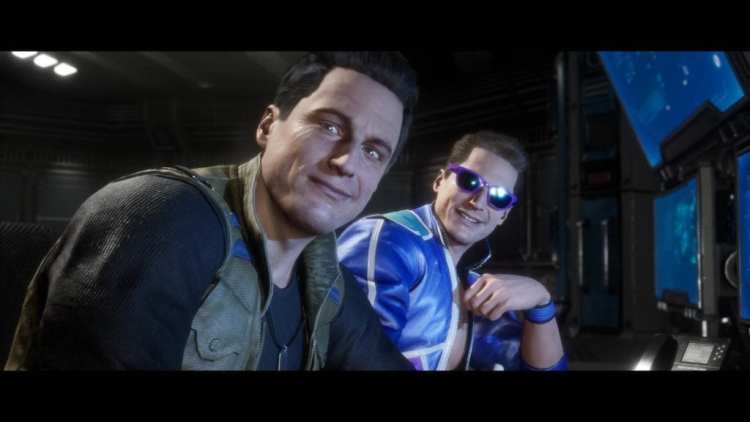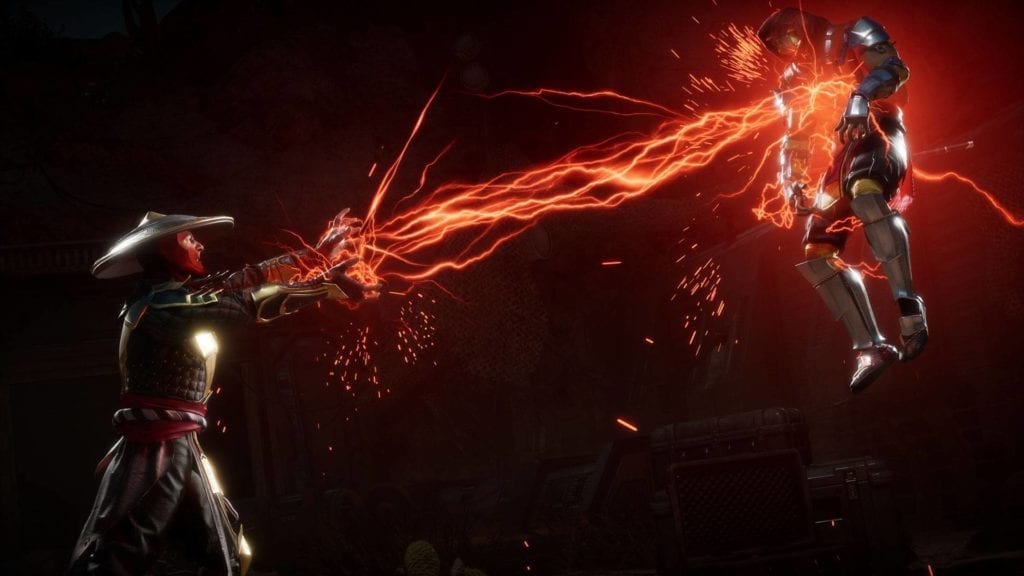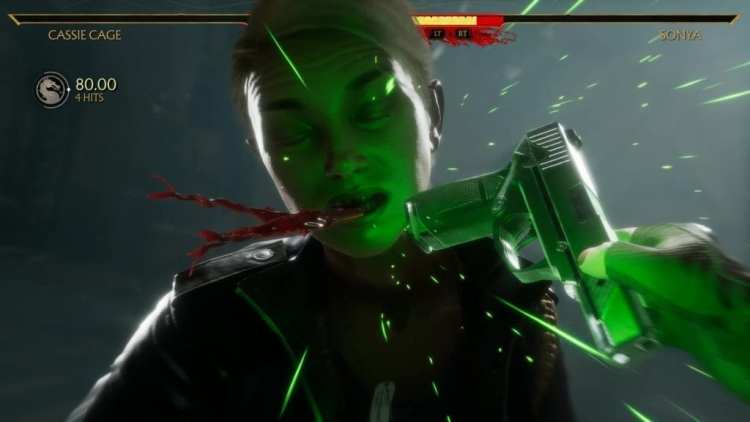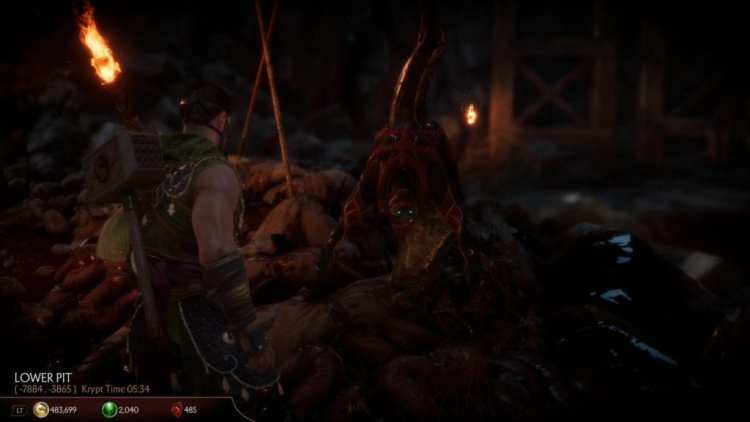Between the Mortal Kombat and Injustice franchises, NetherRealm Studios is continually refining the fighting game formula for both good and bad. With that in mind, Mortal Kombat 11 is the next, and perhaps ultimate, step in the franchise using upgraded gameplay that was introduced in Mortal Kombat X and enhanced with the loot system borrowed from Injustice 2. All of it is wrapped up in a deep sense of nostalgia and fan service as players fight their way through space and time while leaving a trail of blood and gore in their wake. Taken together, the game can be both overwhelming and feel like it’s holding back at the same time.
Doing The Time Warp
At the end of Mortal Kombat X, Raiden was corrupted by Shinnok’s amulet. That’s relatively good news for Earthrealm, which now has a ruthless red lightning protector. However, not everyone appreciates the torture and beheading of an Elder God to make a point. In comes the new series villain, Kronika, who controls time. Angry over the Thunder God’s meddling, she decides to reset the multiverse’s timeline, this time without Raiden in the picture.
That’s when about 30 years of history collides with itself. Versions of fighters are suddenly pulled from the past into the present. Dead characters come back to life, older characters fight and ally with younger versions of themselves, and the new generation introduced in the previous game meets their parents all over again. The story has toyed with time travel themes before, like when Raiden sent a cryptic message back to himself, sure. But this time, it’s going all in.
In many ways, the plot of Mortal Kombat 11 feels like it’s hitting a reset button on the franchise (again), but it’s unclear where it’s headed. As with many time-traveling tales, the story can get a bit muddled and the rules are not always clear. At one point, 90s-era Johnny Cage gets a scar on his face, which suddenly appears on older Cage’s cheek, illustrating how killing one eliminates the other. However, the story doesn’t always follow its own rules, as one character ends up killing a younger version of themselves without any causal repercussions.
There’s also the matter of what success is supposed to look like. Can the timeline be restored if past versions know what their futures hold? Several of the characters end up dying and resurrected as revenants. Knowing this, can they decide to quit their paths and retire, thereby erasing their undead selves from the present? These topics are briefly touched on, but they never go anywhere. Not that it matters much in the end since, without spoiling too much, the story pretty much ends up negating itself with an ending that is both epic and lazy at the same time. Epazy?

Despite a convoluted storyline, comparing young and old versions of characters is still plenty of fun.
It’s also worth noting that having MMA champion Ronda Rousey as the voice of Sonya Blade does little to elevate the character. Although the match up must have sounded great on paper, there’s a lot to be desired in its execution. Rousey’s performance is flat, which stands out like a bleeding acid burn against the other voice actors, who play their roles perfectly during the lengthy cut scenes. Perhaps she would have done better in a live-action reboot of the Mortal Kombat movie franchise. Her voice just seems out of place in the game.
Dialing Mortal Kombat Up To 11
Story aside, the true heart of the game is the fighting, which remains as fast-paced and brutal as ever. Even with the framerate locked at 60 fps on the PC version, it takes skill to keep up with the pace of combat. However, things can become frustrating when fighting characters such as Noob Saibot, whose combination of fast moves, teleportation, and reach makes him feel a bit overpowered. At the same time, teleporting characters like Scorpion, Kung Lao, and Raiden can go way overboard with popping around all over the place.
Mortal Kombat 11 is skewed heavily toward executing combo moves, perhaps even more so than Mortal Kombat X. It’s practically essential to learn how to counter them. Getting stuck on the wrong end of a combo could mean losing almost half your health while you helplessly watch your character having their face pummeled into the ground.
The game’s lengthy tutorial will help you learn everything from basic punching to advanced blocking, but you have to go pretty far into it to learn advanced moves like reversals and using the defense and attack gauges. These are the kinds of things that should be taught in the actual game rather than as a separate section, but there it is. Still, even after learning the basics, fighting characters who can reach through the floor to grab you can still be a pain.
Breaking Heads And Ripping Spines
The spectacular X-ray moves from the previous game are replaced with Krushing and Fatal Blows. Krushing blows enhance otherwise normal moves with extra damage when certain criteria are fulfilled, like when the final hit of a combo connects. Each character has several versions triggered by various pre-requisites. For button-mashing players like me, they happened completely by accident, but they occur often enough to be entertaining.
Meanwhile, Fatal Blows become available when the player has 30 percent health remaining. Players can unleash these devastating moves once per round and will have to wait for it to recharge if they miss. They can completely change the tide of battle, but relegating it to an emergency move also makes it a bit more predictable. While X-rays could occur at any time, players who have their opponents on the ropes may probably expect that a Fatal Blow is soon to come. However, the system is undermined by the fact that Fatal Blows can’t be used on Kronika during the campaign or tower boss fights.
Kronika can’t be stunned or thrown and will call in other fighters to take her place at certain points. While the Mortal Kombat series is known for its tough bosses, battling one that’s essentially three characters treads the line between challenge and annoyance. Especially when you have to do it repeatedly when playing the tower fights.
But it’s what happens after the campaign is done where things truly start to go overboard. Players have access to a roster of 25 fighters that they can customize with different outfits, moves, brutalities, intros, victory animations, and more. Additionally, special augments can be affixed onto the gear, but only after leveling up each component individually. There are thousands of different combinations, which practically guarantees that each character will be unique, even when they’re fighting against themselves. However, there’s a long grind ahead for players who want to outfit their characters, and that’s where the microtransaction system rears its head.
Krypt Creeping
Some customizations are relatively straightforward. Completing the campaign and playing through the Time Towers earns certain outfits. The majority of unlockable content, though, is found in the Krypt using in-game currency to unlock chests that may contain anything from additional Brutalities to concept art and music.
Excluding the premium Time Krystals, there are three currencies to keep track of in the Krypt: Koins, Souls, and Hearts. To unlock items, players need to play an exploration adventure game where they must obtain items like Shao Kahn’s hammer, Kenshi’s blindfold, and more to find their way around several levels in a massive maze-like space for the sake of unlocking loot. Meanwhile, you can bet Koins, forge items from ingredients, and more.
It all becomes a bit much after a while, and I was left wondering why I thought this sort of thing was fun once. Perhaps it was because things were simpler before. Mortal Kombat X only used one type of currency, and wandering its Krypt paths was a relatively straightforward affair. While Mortal Kombat 11’s Krypt feels like a natural evolution, with amazing settings like Goro’s lair and plenty of interaction, it can grow tiresome. I don’t like having to spend hours earning multiple currencies or looking for special items just to open different chests in the hopes of getting something of interest.
Clearly, the system is meant to nudge players toward the premium store to quickly unlock gear. Given the sheer variety of equipment, doing so could potentially cost much more than the game itself. I almost long for the time when players could pay a flat fee to have the entire Krypt unlocked, but such a system probably wouldn’t work in this case. Players can spend in-game currency to reset the chests so that they can be re-opened. Therefore, the Krypt represents a near endless grind for players to either enjoy or endure.
Final Round
As a straight fighting game, Mortal Kombat 11 brings the blood-soaked action that longtime fans expect from the series. Although the gameplay is skewed heavily toward experienced fighters for competitions, middling players like myself can still find enjoyment in the matches and pulling off various fatalities. But the game feels like it goes downhill once the campaign is completed. After that, it’s a matter of trying to grab gear so you can better fight your way up the towers or take on opponents online. At some point, the game becomes a big chore.










Published: May 6, 2019 07:37 pm